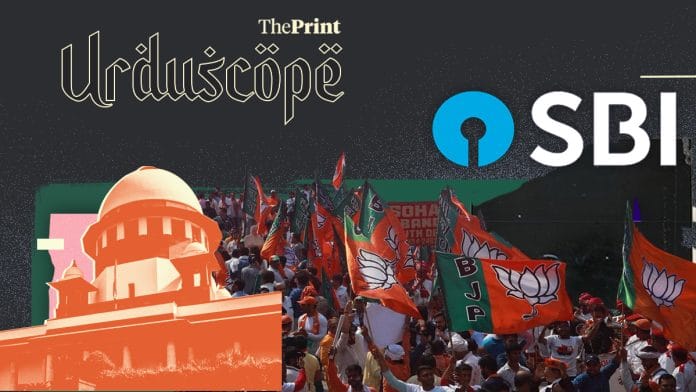New Delhi: Although Delhi Chief Minister Arvind Kejriwal’s arrest in connection with an alleged excise scam was front and centre in the Urdu press this week, it was the State Bank of India’s disclosures on electoral bonds which kept their editorials buzzing.
In its editorial on 19 March, Siasat claimed it was unlikely that the ruling Bharatiya Janata Party (BJP), the top beneficiary of these bonds, did not know the identity of its donors.
It was referring to the party’s claim to the Election Commission of India (ECI) that it was “not required to maintain the names and particulars of the donors of the Electoral Bonds and as such the Party has not maintained these particulars”.
“The BJP has an organised machinery for every task, whether it’s elections or silencing the opposition. Their claim that they don’t know the identity of their donors and contributors could be seen as a lie,” it said.
Revealing identities of its donors isn’t mandated by the law but it’s crucial for transparency, the editorial said. “They may argue that they don’t want to disclose identities and use the pretext of law to do so, but due to the case being linked to the Supreme Court, the BJP is trying to tread cautiously,” the editorial said.
The other topics that saw prominent coverage this week were the frenzied activities in political camps in light of the upcoming general elections and the attack on foreign students who were offering namaz at a hostel at Gujarat University.
Here’s a wrap of all the news that made it to the front pages and editorials of the Urdu press this week.
Kejriwal’s arrest and electoral bonds
Delhi Chief Minister Arvind Kejriwal was on corruption allegations this week over his government’s now-scrapped 2021-22 excise policy. The Enforcement Directorate has accused several ministers in the Delhi government — including the former anti-corruption crusader Kejriwal — of getting kickbacks in return for preferential treatment.
The Opposition INDIA bloc, of which Kejriwal’s Aam Aadmi Party is a part, has called the arrest a “witch-hunt”.
The development comes at a time when electoral bonds are causing a political maelstrom, with the Supreme Court, which struck down the scheme in February, repeatedly demanding that the SBI make full disclosures on bonds.
In its editorial on 20 March, Roznama Rashtriya Sahara noted that the SBI, India’s largest public sector bank and the only one authorised to issue electoral bonds, has surpassed even the BJP in providing “incomplete information”. Significantly, the SBI, on SC’s insistence, has now published these details on the ECI’s website.
“(SBI)’s attempts at evasion failed, leading the Election Commission of India to disclose bond information on its website. However, even this data is incomplete and flawed. Divided into sets, one lists individuals and companies purchasing bonds, while the other names political parties benefiting from these bonds. Due to discrepancies in this collection, it’s impossible to track who bought how many bonds and donated to which party,” the editorial said.
Elections
As expected, the upcoming Lok Sabha election continued to get prominent coverage, with some editorials advising voters to cast their ballots responsibly.
In its editorial titled ‘Mockery of Voters’ on 21 March, Saisat denounced political defections, saying that the trend of political splinter groups claiming to be the original party from which it broke away could “undermine democratic principles”.
The editorial was referring to the Supreme Court’s observations this week over the legal dispute between Nationalist Congress Party founder Sharad Pawar and his nephew and Maharashtra Deputy Minister Ajit Pawar over the party’s name and symbol. During the hearing this week, the apex court questioned the ECI’s rationale of giving official recognition to the Ajit Pawar faction only on the test of “legislative majority”.
Meanwhile, Sahara’s editorial on 17 March warns against hate speeches ahead of elections. Now that election dates have been announced, there’s a concern that some politicians and political parties might attempt to “influence” communal harmony in the country, it said.
“Provocative or hate-filled remarks could be made. It’s essential for the people of the country not to fall for any kind of instigation. Don’t become someone’s pawn. Keep your senses under control and use your vote with utmost seriousness by keeping in mind the interests of the country and its people,” the editorial said.
Attack on Gujarat University students
The Urdu press condemned the mob attack on five foreign students while they were offering namaz at Gujarat University, Ahmedabad, this week. At least two people have been arrested in the case.
Sahara’s editorial on 22 March highlighted this incident as well as the murder of two young children allegedly by a Muslim man in Budaun in Uttar Pradesh. The motive of the second incident remains unclear, the editorial said, adding that the communal tensions it has sparked make an impartial inquiry crucial.
“…it wouldn’t be wrong to say that the murder of two innocent children has also caused the blood of trust and faith that existed between the two communities to spill,” the editorial said.
Siasat’s 18 March editorial was an excoriating take on the Gujarat attack. The editorial, titled ‘Attack on Namazi is the Gujarat Model’, lambasted Prime Minister Narendra Modi and Home Minister Amit Shah, both of whom are from the state.
The attack was “morally reprehensible”, and is a reflection of how extremist ideologies have poisoned the minds of youth, the editorial said.
“The atmosphere in Gujarat, the home state of Prime Minister Narendra Modi and Home Minister Amit Shah, has long been tense. The 2002 riots in Gujarat brought shame and embarrassment to India globally. Ironically, Gujarat and its leaders have not felt ashamed to this day. Instead, they feel somewhat proud,” the editorial said, calling for swift identification, arrest, and sentencing of those responsible for the attack. “However, it’s disheartening that attackers, after a short jail term, often become emboldened to repeat their actions. This trend prioritises perpetrators over justice for victims, thus perpetuating evil,” the editorial said.
(Edited by Uttara Ramaswamy)






